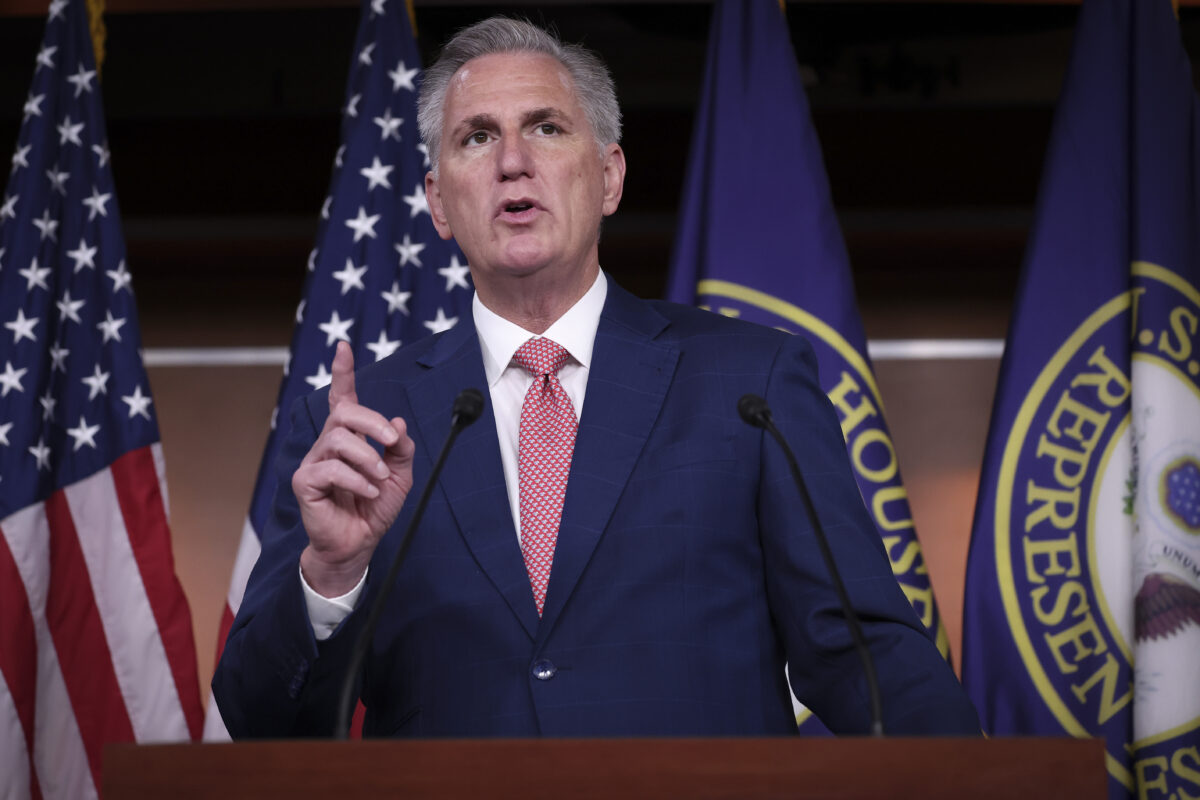White House Blasts GOP Debt-Ceiling Proposal: ‘Blueprint to Devastate’ American Families
White House press secretary Karine Jean-Pierre has issued a sharply critical statement on the Republican debt-ceiling proposal, calling it a “blueprint to devastate hard-working American families” and accusing the GOP of “holding the American economy hostage” in order to push for spending cuts. Her statement, issued on Thursday, builds on a rebuke of the Republican plan by President Joe Biden on Wednesday, who called it a “MAGA economic agenda” to cut benefits for “folks they don’t seem to care much about.” The United States reached its $31.4 trillion debt ceiling in January, leaving it to a politically divided Congress to raise the cap and allow the government to keep paying its bills. Democrats have insisted on a bill with no preconditions to raise the debt ceiling, while Republicans have demanded spending cuts in exchange for their support to lift the borrowing cap. House Republicans on Wednesday introduced legislation to raise the debt ceiling by $1.5 trillion or until March 31, 2024, whichever comes first, while laying out a series of spending cuts. “If Washington wants to spend more, it will have to come together and find savings elsewhere, just like every household in America,” McCarthy said on the House floor on Wednesday. “President Biden has a choice. Come to the table and stop playing partisan political games, or cover his ears, refuse to negotiate, and risk bumbling his way into the first default in our nation’s history,” McCarthy added. Reacting to the Republican plan, the White House press secretary issued a statement that accused McCarthy of siding with “extreme MAGA” Republicans and calling the proposal a “blueprint to devastate hard-working American families.” “MAGA House Republicans are holding the American economy hostage in order to take a hatchet to programs Americans rely on every day to make ends meet,” she said. Jean-Pierre argued that if Republicans vote for the bill, they will be supporting measures that cut funding for programs like education, veterans medical care, cancer research, Meals on Wheels, food safety, and law enforcement. Biden on Wednesday accused the Republican proposal of being “not about fiscal discipline” but about “finding ways to squeeze out more of America’s middle class.” President Joe Biden delivers remarks on the economy at an International Union of Operating Engineers Local 77 union training facility in Accokeek, Md., on April 19, 2023. (Nathan Howard/Getty Images) GOP Debt-Ceiling Plan Called the Limit, Save, Grow Act of 2023, the 320-page bill calls for returning discretionary spending to 2022 levels, capping spending growth to 1 percent per year, and repealing certain tax credits. The plan would also cancel Biden’s student loan forgiveness program, take back unspent COVID-19 relief funds, remove barriers to increased domestic energy production, and reimpose work requirements for many people collecting welfare. Specifically, the plan proposed by Republicans would decrease Congress-approved annual spending to $1.47 trillion and cap growth at 1 percent annually over the next 10 years, effectively acting as a spending cut. The caps would not apply to benefit programs such as Social Security and Medicare, however. The plan would also cancel the remaining money from the $5.2 trillion in COVID-19 relief programs Congress approved between 2020 and 2022. According to the White House, less than $80 billion of this remained unspent in January, with most of the money earmarked for union pension funds, veterans’ health care, and medical research. President Biden’s efforts to cancel approximately $400 billion in student debt is also on the chopping block. Republicans have argued that the student debt wipeout is unfair to those who didn’t rack up loans to go to college or who sacrificed to pay off their debts. The plan would also repeal incentives for renewable energy, electric vehicles, and other supposedly green technology that Democrats passed last year as part of the Inflation Reduction Act. The Republican plan would also stiffen work requirements for participants in the Supplemental Nutrition Assistance Program (SNAP) that provides grocery money for low-income people. The plan would also give Congress more power to review new rules put forward by the executive branch, potentially giving Republicans more power to block regulations they consider harmful. The package includes a fossil-fuel bill aimed at promoting energy development on federal lands, reducing regulations, and eliminating Democratic-backed climate incentives. Rep. Kevin McCarthy (R-Calif.) answers questions during a press conference at the U.S. Capitol in Washington, on July 29, 2022. (Win McNamee/Getty Images) X-Date After the United States reached the $31.4 trillion debt cap in January, the Treasury Department started resorting to so-called “extraordinary measures” to keep making payments on outstanding federal debt obligations and keep the government from defaulting. These e

White House press secretary Karine Jean-Pierre has issued a sharply critical statement on the Republican debt-ceiling proposal, calling it a “blueprint to devastate hard-working American families” and accusing the GOP of “holding the American economy hostage” in order to push for spending cuts.
Her statement, issued on Thursday, builds on a rebuke of the Republican plan by President Joe Biden on Wednesday, who called it a “MAGA economic agenda” to cut benefits for “folks they don’t seem to care much about.”
The United States reached its $31.4 trillion debt ceiling in January, leaving it to a politically divided Congress to raise the cap and allow the government to keep paying its bills.
Democrats have insisted on a bill with no preconditions to raise the debt ceiling, while Republicans have demanded spending cuts in exchange for their support to lift the borrowing cap.
House Republicans on Wednesday introduced legislation to raise the debt ceiling by $1.5 trillion or until March 31, 2024, whichever comes first, while laying out a series of spending cuts.
“If Washington wants to spend more, it will have to come together and find savings elsewhere, just like every household in America,” McCarthy said on the House floor on Wednesday.
“President Biden has a choice. Come to the table and stop playing partisan political games, or cover his ears, refuse to negotiate, and risk bumbling his way into the first default in our nation’s history,” McCarthy added.
Reacting to the Republican plan, the White House press secretary issued a statement that accused McCarthy of siding with “extreme MAGA” Republicans and calling the proposal a “blueprint to devastate hard-working American families.”
“MAGA House Republicans are holding the American economy hostage in order to take a hatchet to programs Americans rely on every day to make ends meet,” she said.
Jean-Pierre argued that if Republicans vote for the bill, they will be supporting measures that cut funding for programs like education, veterans medical care, cancer research, Meals on Wheels, food safety, and law enforcement.
Biden on Wednesday accused the Republican proposal of being “not about fiscal discipline” but about “finding ways to squeeze out more of America’s middle class.”

GOP Debt-Ceiling Plan
Called the Limit, Save, Grow Act of 2023, the 320-page bill calls for returning discretionary spending to 2022 levels, capping spending growth to 1 percent per year, and repealing certain tax credits.
The plan would also cancel Biden’s student loan forgiveness program, take back unspent COVID-19 relief funds, remove barriers to increased domestic energy production, and reimpose work requirements for many people collecting welfare.
Specifically, the plan proposed by Republicans would decrease Congress-approved annual spending to $1.47 trillion and cap growth at 1 percent annually over the next 10 years, effectively acting as a spending cut. The caps would not apply to benefit programs such as Social Security and Medicare, however.
The plan would also cancel the remaining money from the $5.2 trillion in COVID-19 relief programs Congress approved between 2020 and 2022. According to the White House, less than $80 billion of this remained unspent in January, with most of the money earmarked for union pension funds, veterans’ health care, and medical research.
President Biden’s efforts to cancel approximately $400 billion in student debt is also on the chopping block. Republicans have argued that the student debt wipeout is unfair to those who didn’t rack up loans to go to college or who sacrificed to pay off their debts.
The plan would also repeal incentives for renewable energy, electric vehicles, and other supposedly green technology that Democrats passed last year as part of the Inflation Reduction Act.
The Republican plan would also stiffen work requirements for participants in the Supplemental Nutrition Assistance Program (SNAP) that provides grocery money for low-income people.
The plan would also give Congress more power to review new rules put forward by the executive branch, potentially giving Republicans more power to block regulations they consider harmful.
The package includes a fossil-fuel bill aimed at promoting energy development on federal lands, reducing regulations, and eliminating Democratic-backed climate incentives.

X-Date
After the United States reached the $31.4 trillion debt cap in January, the Treasury Department started resorting to so-called “extraordinary measures” to keep making payments on outstanding federal debt obligations and keep the government from defaulting. These extraordinary measures, however, will run out at some point.
The federal government could reach the moment when it will no longer be able to meet its financial obligations—known as the X-date—as early as June 5, according to a January letter (pdf) to lawmakers from Treasury Secretary Janet Yellen.
When the X-date is reached and there’s no agreement to lift the debt cap, Treasury will be unable to issue any more bills, bonds, or notes. It could only make payments on its debt obligations from tax revenues.
Yellen is expected in the next few days to revise the X-date, which analysts have generally put at a later date than June 5, seeing it as a worst-case scenario that she presented to lawmakers in her letter.

The nonpartisan Congressional Budget Office (CBO) has projected that the X-date would fall at some point between July and September.
Investment bank Goldman Sachs said recently that it expects the X-date will come at some point in June, while JPMorgan analysts said in a note Wednesday that they see the deadline coming in the middle of August.
Markets have already started showing early signs that investors are stressed about a possible debt default.
On Thursday, jitters over the debt-ceiling deadlock in Washington sent the cost of insuring exposure to U.S. government debt to its highest level in over a decade.
Spreads on U.S. five-year credit default swaps, which are market-based measures of default risk, widened to 49 basis points, according to S&P Global Market Intelligence data. That’s more than twice the level the swaps stood at in January.
JPMorgan analysts said in the note that they see a “non-trivial” risk of a U.S. debt default.
Both Democrats and Republicans have warned that failure to meet the country’s debt obligation would be disastrous for the economy.
Yet while Republicans have pushed for Democrat commitments to cut spending in exchange for agreeing to lift the borrowing cap, Biden has so far insisted on a clean bill to raise it.
A bipartisan group of lawmakers known as the Problem Solvers Caucus recently released a one-page document that proposes suspending the debt ceiling until Dec. 31, establishing an independent fiscal commission, adopting deficit stabilization controls, and revising the budget process.
The caucus, which is made up of 31 Republican and 32 Democrat members of the House, has proposed this solution to the debt-ceiling deadlock if no breakthrough deal is reached.
“We’ve seen their one-pager,” the White House press secretary said during a briefing on April 19. “We have a very close and respectful relationship, a good relationship, with the Problem Solvers Caucus. I just don’t have a reaction to share at this time.”
“Our position continues to be to not negotiate over default. This is something that is the responsibility, the obligation of congressional members. They were able to do this three times in the last administration.”












